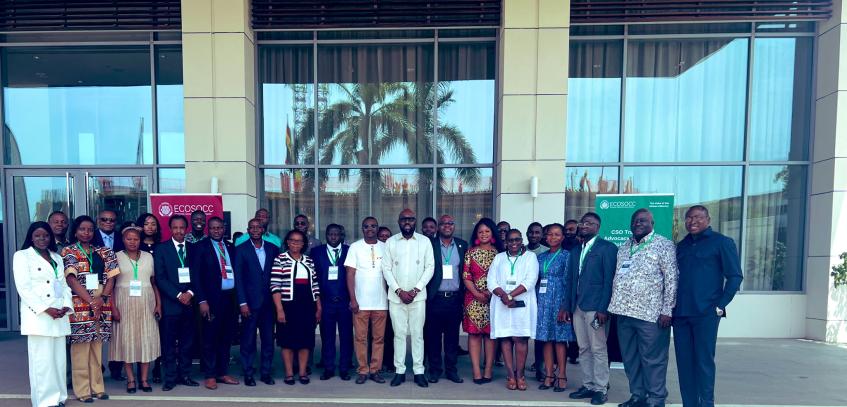The African Union's Economic, Social, and Cultural Council (ECOSOCC) has concluded a three-day training session in Accra, Ghana, aimed at equipping Civil Society Organizations (CSOs) with advocacy techniques and strategic policy engagement within the Conflict Management Cycle. This initiative, part of the EU-APSA IV Programme, reflects growing momentum to ensure civil society's structured involvement in African Union peace and security policy formulation and implementation.
The high-impact initiative was designed to equip CSOs with advocacy and policy engagement skills necessary to influence decision-making at regional and continental levels and to strengthen their understanding of the African Peace and Security Architecture (APSA) and the Conflict Management Cycle.
The training, which drew participants from across the continent, underscored ECOSOCC' s commitment to empowering civil society as a cornerstone of Africa's peace and security agenda, in line with the Livingstone Formula.
Officially opening the training, the Ambassador of the Republic of Ghana to the Federal Democratic Republic of Ethiopia and Permanent Representative of Ghana to the African Union, Dr. Robert Afriyie, shared his experiences from a global perspective, highlighting Accra's historical legacy as a cradle of Pan-African unity and democratic participation, and the critical role of CSOs.
"I have seen firsthand how CSOs shape narratives and influence peace processes. CSOs have demonstrated their immense power to foster peace. Our training here is about more than technical skills; it is about nurturing an unwavering commitment to objective, consistent advocacy for Africa's future," Amb. Afriyie stressed.
Amb. Afriyie stressed the need for objective observation, careful separation of short-term narratives from long-term truths, and the importance of working collectively ("our" vs. "theirs"), in approaching peace and development efforts. He quoted Dr. Nkosazana Dlamini Zuma's visionary "Email from the Future," emphasizing that the peace of Africa is not only a precondition but a determinant of its development.
Mr. William Carew, Head of ECOSOCC Secretariat, stressed the importance of collective effort in peacebuilding, saying, "The scourge of conflict constitutes a major obstacle to Africa's socio-economic development. Peace, security, and stability are prerequisites for integration and growth. This training is not just timely; it is critical. We are here to equip CSOs with practical advocacy techniques and policy engagement strategies to ensure your voices are heard, your evidence is valid, and your solutions are integrated into policy frameworks."
Mr. Carew also highlighted how civil society actors are central to bringing life to the principles of intervention, resolution, and reconstruction embedded within the APSA, stressing, "Conflicts in Africa are complex, rooted in deep historical, political, and economic realities. Those most affected - the communities - must not be excluded from the solutions."
Mr. Emmanuel Nzunda, Assistant Secretary General of the Organization of African Trade Union Unity (OATUU), reinforced the call for inclusive conflict prevention and resolution, stating: "Africa continues to grapple with security challenges with marginalized groups like women and children suffering the most. Inclusive peacebuilding is not optional; it is essential for achieving the goals of the AU's Agenda 2063. Trade unions and CSOs must be recognized as pivotal players in policy formulation, implementation, and evaluation." He referenced concrete examples where CSO involvement led to successful conflict prevention outcomes and stressed the need for multi-stakeholder partnerships across Member States and AU organs.
Adding to the discussion, Mr. Boniface Cheembe, ECOSOCC Peace and Security Cluster Chair, emphasized the evolving security threats facing Africa, from asymmetric warfare to violent extremism. "As civil society, we must strengthen our expertise to engage effectively within existing continental frameworks. Popular participation is not a privilege; it is a right. We are the fourth estate, providing alternative voices for peace, security, and social justice across the continent," he emphasized. The three-day training included sessions on stakeholder mapping, evidence-based advocacy, AU policy entry points, and message framing for impact. Participants also developed practical action plans for influencing AU and Member State policy, to be integrated into a workshop outcome document. This training combined theoretical and practical sessions to ensure that participating organizations leave empowered to contribute to Africa's peace and security goals.
As part of the training, the participants also paid a courtesy visit to the headquarters of the Organization of African Trade Union Unity (OATUU) on the third day, welcomed by Secretary General Mr. Arezki Mezhoud. This visit underscored ECOSOCC's commitment to fostering collaboration and enhancing civil society engagement within Africa's peace and security architecture.





